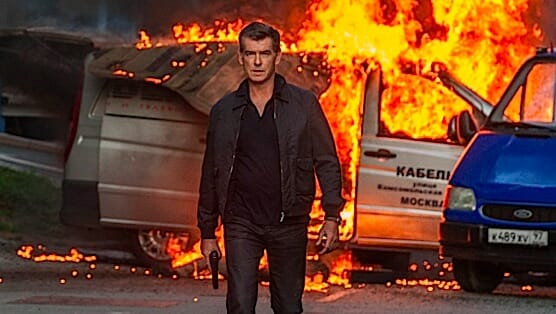The November Man

Whether or not they’re dreaming, Relativity Media certainly thinks you’re all going to see their new spy thriller The November Man, because they’ve already set the wheels in motion for a sequel. And for the first little bit of the Roger Donaldson-directed film you might be okay with that. It doesn’t do anything to reinvent the wheel, but, for a while anyway, this is a solid, if by-the-numbers, tale of espionage. that harkens back to the height of the Cold War, where U.S. and Russian intelligence forces battled back and forth for information and the control of assets, and where hidden, behind-the-scenes action had a massive impact on the world at large. Unfortunately, that only lasts for a little while.
Based on the novel There Are No Spies by Bill Granger, The November Man hits on all the spy movie tropes you expect. The hero, Peter Devereaux (Pierce Brosnan playing a spy yet again), is a CIA agent with a long, illustrious career, but when one job goes wrong, that’s it—he’s done. But you know how these things go, and a few years later an old buddy, Hanley (Bill Smitrovich), convinces him to come back for one last, very personal, just-when-you-think-you’re-out-they-pull-you-back-in mission. Things don’t go well, and before long Devereaux is on the run with the beautiful Alice (Olga Kurylenko), coming to blows with his former protégé, David Mason (Luke Bracey), and carrying the fate of a large part of the world in his reluctant hands.
There are some decent car chases; lots of taut scenes where a character almost gets caught doing something sneaky; a tense, driving score; old allies coming into conflict; and numerous story strands. It’s that shades-of-gray world of international intrigue where the bad guys are bad, but even the supposed good guys aren’t so squeaky clean, either.
When it sticks to that, The November Man is moderately entertaining, especially in a nostalgic way for those who grew up on such fare in the 1970s and ’80s. One can’t help but think of genre-defining films like Three Days of the Condor and The Conversation, and those who have read a lot of John Le Carre novels will be satisfied with this portion of the movie. It hits all of the right notes, but also falls into all of the same traps as many of its predecessors.
-

-

-

-

-

-

-

-

-

-

-

-

-

-

-

-

-

-

-

-

-

-

-

-

-

-

-

-

-

-

-

-

-

-

-

-

-

-

-

-








































